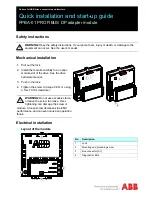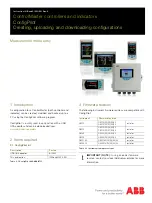
68
Program description: Dual Rate / Expo – model helicopter
Dual Rate / Expo
Switchable control characteristics for roll, pitch-axis and tail rotor
SEL
SEL
100%
100%
100%
0%
0%
0%
roll
nick
tail
DUAL
EXPO
The Dual Rate / Expo function provides a means of
switching to reduced control travels, and infl uencing the
travel characteristics, for the roll, pitch-axis and tail rotor
servos (control functions 2 … 4). This can be carried out
in fl ight by means of a switch.
A separate curve for control function 1 (motor / collective
pitch) can be set individually for throttle, collective pitch
and tail rotor in the »
heli mixer
« menu. These curves
feature up to fi ve separately programmable points; see
the section starting on page 78 and also page 118.
Dual Rate
works in a similar way to transmitter control
travel adjustment in the »
contr set.
« menu, i. e. it affects
the corresponding stick function, regardless of whether
that function controls a single servo or multiple servos
via any number of complex mixer and coupling functions.
For each switch position the servo travels can be set to
any value within the range 0 to 125% of full travel.
Expo
works in a different way. If you set a value greater
than 0%, exponential provides fi ne control of the model
around the centre position of the primary control func-
tions (roll, pitch-axis and tail rotor), without forfeiting full
travel at the end-points of stick movement. If you set
a value lower than 0%, travel is increased around the
neutral position, and diminishes towards the extremes of
travel. The degree of “progression” can be set within the
range -100% to +100%, where 0% equates to normal,
linear control characteristics.
Another application for exponential is to improve the
linearity of rotary-output servos, which are the standard
nowadays. With a rotary servo the movement of the
control surface is inevitably non-linear, as the linear
movement of the output disc or lever diminishes pro-
gressively as the angular movement increases, i. e. the
rate of travel of the control surface declines steadily
towards the extremes, dependent upon the position of
the linkage point on the output disc or lever. You can
compensate for this effect by setting an Expo value
greater than 0%, with the result that the angular travel of
the output device increases disproportionately as stick
travel increases.
Like Dual Rates, the Expo setting applies directly to the
corresponding stick function, regardless of whether that
function controls a single servo or multiple servos via
any number of complex mixer and coupling functions.
The Dual Rate and Expo functions can also be switched
together if you assign a switch to the function. The result
of this is that Dual Rates and Expo can be controlled
simultaneously using a single switch, and this can be
advantageous – especially with high-speed models.
The basic set-up procedure
Hold the rotary cylinder pressed in to select the de-
1.
sired line: “aile”, “elev” or “rudd”.
Use the rotary cylinder to select
2.
SEL
under the
DUAL or EXPO column, so that you can make ad-
justments at that point.
Press the rotary cylinder. The appropriate input fi eld
3.
is now highlighted.
Set the desired value using the rotary cylinder.
4.
Press the rotary cylinder to conclude the input proc-
5.
ess and return to the function fi eld.
Dual Rate function
If you wish to switch between two possible D/R settings,
select the
symbol and assign a physical switch as
described in the section “Assigning switches and control
switches” on page 33.
SEL
SEL
100%
100%
100%
0%
0%
0%
roll
nick
tail
DUAL
EXPO
push desired switch
i n t o p o s i t i o n O N
Select the left-hand
SEL
fi eld to change the Dual Rate
value, and use the rotary cylinder in the highlighted fi eld
to set the values for each of the two switch positions
separately.
Pressing
CLEAR
in the highlighted fi eld resets an
altered value to 100%.
Caution:
The Dual Rate value should always be at least 20% of
total control travel, otherwise you could lose all control of
that function.
Examples of different Dual Rate values:
Ser
v
o tr
a
v
el
Ser
v
o tr
a
v
el
Ser
v
o tr
a
v
el
Stick deflection
Stick deflection
Stick deflection
Dual Rate = 100%
Dual Rate = 50%
Dual Rate = 20%
Summary of Contents for mx-16 ifs
Page 1: ...mx 16 Programming Manual mx 16iFS 1 gb 3D CYLINDER ROTARY SELECT INTELLIGENT FREQUENCY SELECT...
Page 15: ...15 For your notes...
Page 31: ...31 For your notes...
Page 35: ...35 For your notes...
Page 39: ...39 For your notes...
Page 55: ...55 For your notes...
Page 65: ...65 For your notes...
Page 77: ...77 For your notes...
Page 104: ...104 For your notes...
Page 111: ...111 For your notes...
Page 128: ...128 For your notes 128...
Page 129: ...129 For your notes 129...
Page 130: ...130 For your notes...
















































